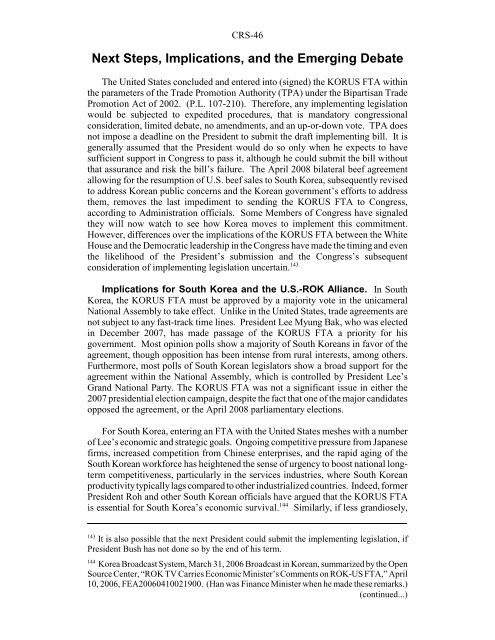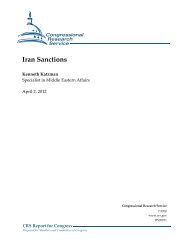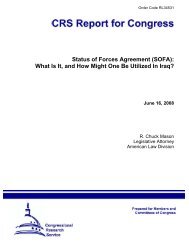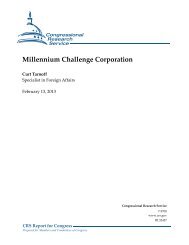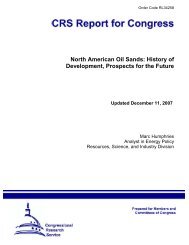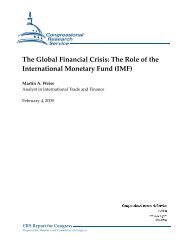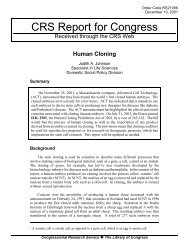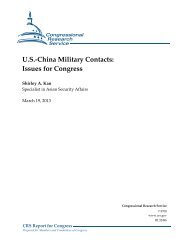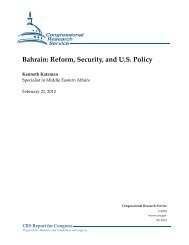The Proposed U.S.-South Korea Free Trade Agreement (KORUS ...
The Proposed U.S.-South Korea Free Trade Agreement (KORUS ...
The Proposed U.S.-South Korea Free Trade Agreement (KORUS ...
- TAGS
- korea
- fpc.state.gov
You also want an ePaper? Increase the reach of your titles
YUMPU automatically turns print PDFs into web optimized ePapers that Google loves.
CRS-46<br />
Next Steps, Implications, and the Emerging Debate<br />
<strong>The</strong> United States concluded and entered into (signed) the <strong>KORUS</strong> FTA within<br />
the parameters of the <strong>Trade</strong> Promotion Authority (TPA) under the Bipartisan <strong>Trade</strong><br />
Promotion Act of 2002. (P.L. 107-210). <strong>The</strong>refore, any implementing legislation<br />
would be subjected to expedited procedures, that is mandatory congressional<br />
consideration, limited debate, no amendments, and an up-or-down vote. TPA does<br />
not impose a deadline on the President to submit the draft implementing bill. It is<br />
generally assumed that the President would do so only when he expects to have<br />
sufficient support in Congress to pass it, although he could submit the bill without<br />
that assurance and risk the bill’s failure. <strong>The</strong> April 2008 bilateral beef agreement<br />
allowing for the resumption of U.S. beef sales to <strong>South</strong> <strong>Korea</strong>, subsequently revised<br />
to address <strong>Korea</strong>n public concerns and the <strong>Korea</strong>n government’s efforts to address<br />
them, removes the last impediment to sending the <strong>KORUS</strong> FTA to Congress,<br />
according to Administration officials. Some Members of Congress have signaled<br />
they will now watch to see how <strong>Korea</strong> moves to implement this commitment.<br />
However, differences over the implications of the <strong>KORUS</strong> FTA between the White<br />
House and the Democratic leadership in the Congress have made the timing and even<br />
the likelihood of the President’s submission and the Congress’s subsequent<br />
consideration of implementing legislation uncertain. 143<br />
Implications for <strong>South</strong> <strong>Korea</strong> and the U.S.-ROK Alliance. In <strong>South</strong><br />
<strong>Korea</strong>, the <strong>KORUS</strong> FTA must be approved by a majority vote in the unicameral<br />
National Assembly to take effect. Unlike in the United States, trade agreements are<br />
not subject to any fast-track time lines. President Lee Myung Bak, who was elected<br />
in December 2007, has made passage of the <strong>KORUS</strong> FTA a priority for his<br />
government. Most opinion polls show a majority of <strong>South</strong> <strong>Korea</strong>ns in favor of the<br />
agreement, though opposition has been intense from rural interests, among others.<br />
Furthermore, most polls of <strong>South</strong> <strong>Korea</strong>n legislators show a broad support for the<br />
agreement within the National Assembly, which is controlled by President Lee’s<br />
Grand National Party. <strong>The</strong> <strong>KORUS</strong> FTA was not a significant issue in either the<br />
2007 presidential election campaign, despite the fact that one of the major candidates<br />
opposed the agreement, or the April 2008 parliamentary elections.<br />
For <strong>South</strong> <strong>Korea</strong>, entering an FTA with the United States meshes with a number<br />
of Lee’s economic and strategic goals. Ongoing competitive pressure from Japanese<br />
firms, increased competition from Chinese enterprises, and the rapid aging of the<br />
<strong>South</strong> <strong>Korea</strong>n workforce has heightened the sense of urgency to boost national longterm<br />
competitiveness, particularly in the services industries, where <strong>South</strong> <strong>Korea</strong>n<br />
productivity typically lags compared to other industrialized countries. Indeed, former<br />
President Roh and other <strong>South</strong> <strong>Korea</strong>n officials have argued that the <strong>KORUS</strong> FTA<br />
is essential for <strong>South</strong> <strong>Korea</strong>’s economic survival. 144 Similarly, if less grandiosely,<br />
143 It is also possible that the next President could submit the implementing legislation, if<br />
President Bush has not done so by the end of his term.<br />
144 <strong>Korea</strong> Broadcast System, March 31, 2006 Broadcast in <strong>Korea</strong>n, summarized by the Open<br />
Source Center, “ROK TV Carries Economic Minister’s Comments on ROK-US FTA,” April<br />
10, 2006, FEA20060410021900. (Han was Finance Minister when he made these remarks.)<br />
(continued...)


